March 2020 - Highlights and Hot Topics

Letter from the Executive Director
 I am looking forward to the time when I can send out a typical monthly Executive Director article. Unfortunately, this is not a typical month.
I am looking forward to the time when I can send out a typical monthly Executive Director article. Unfortunately, this is not a typical month.
Governor Roy Cooper has declared a state of emergency because of COVID-19. As of March 12, our staff at NCCDD began working from home as necessary, as recommended by Secretary Mandy Cohen. Please make sure to check the DHHS website regularly for updates on COVID-19.
All of this has made me think seriously about people with intellectual and other developmental disabilities (I/DD) across North Carolina who rely on direct support professionals and others. It can be critical for these individuals to have supports when they need them.
On March 6, 2020, DHHS posted “North Carolina Emergency Management Guidance on considerations of people with disabilities and other access and functional needs for COVID-19.” This document contains important guidance related to people with disabilities, including the following key items:
- “All disability service providers must [ensure] continuity of operations.”
- Paratransit and other transportation for people with disabilities to get to medical providers, employment and other essential destinations should be maintained.
- There should be measures to ensure people receive their medications.
- And, there should be “well-stocked emergency preparedness kits for in-home to include activities of daily living supplies, food, water and medications for an extended period.”
There may be additional guidance sent out soon for people with disabilities receiving supports and providers. Please check the DHHS website regularly.
It is critical that we support each other during this state of emergency. Please make sure that you have what you need during this time. Also, make sure your friends, families and neighbors with disabilities have what they need. Everyone should have a plan for any emergency or gap in service. Let’s look out for each other even while we are taking precautions to avoid spreading the virus.
Talley Wells, Executive Director
Public Policy Update as of March 12

FEDERAL
Coronavirus (Covid-19) Appropriations
H.R.6074 passed the House and Senate with overwhelming support on March 5. The total funding package provides $7.8 billion in discretionary funding including: grants to states, purchasing and stockpiling power for the federal government, funds to spur vaccine development and funding to respond to coronavirus abroad. An additional $500 million will fund the estimated cost to allow certain Medicare patients to use telehealth technologies to access care.
Rights
After years of litigation and thousands of submitted comments to a 2016 proposed rule, the Food and Drug Administration (FDA) published a final rule prohibiting electrical stimulation devices (ESDs) for self-injurious or aggressive behavior. The rule, specifically referencing the Judge Rotenberg Educational Center in Massachusetts, takes effect on April 6, and all individuals currently subject to the devices must be transitioned off by September 2. The FDA’s announcement of the rule can be found here.
Community Living
Bipartisan members of both the House and Senate introduced the Recognizing the Role of Direct Support Professionals Act (S.3369/H.R.6045). This bill directs the Office of Management and Budget (OMB) to revise the Standard Occupational Classification system to create a separate code for Direct Support Professionals (DSPs). This change will aid states and the federal government to collect more accurate data to address turnover and shortages. A synopsis of the bill can be found here.
On March 6, the Senate passed the Supporting Older Americans Act of 2020 (H.R.4334). This bill reauthorizes the Older Americans Act, including the National Family Caregiver Support Program (NFCSP). This bill also removes a 10% cap on funding for services for "older relative caregivers," a term that includes family caregivers of adults with disabilities ages 18-59.
On February 24, the Senate passed the Lifespan Respite Care Reauthorization Act of 2019 (S.995). The Lifespan Respite Care Program, through grants to states, helps build coordinated state lifespan respite systems, assists family caregivers to pay for respite or find funding sources, encourages development of new and innovative community and faith based respite opportunities, and trains respite workers and volunteers. NCCDD reported on the companion House bill (H.R.2035) which passed last summer. The House will need to pass S.995 before sending it to the president for signing.
The Home and Community Based Services (HCBS) Infrastructure Improvement Act (S.3277) was introduced in the Senate on February 12. This bill provides seven-year grants to states to improve the Home and Community Based Services systems by doing at least three of the following:
- Increasing the availability of housing;
- Expanding transportation options;
- Increasing wages, benefits and support for direct support professionals;
- Expanding competitive, integrated employment; and
- Building no-wrong-door application, referral and counseling systems.
Additional information can be found here.
Education
The Individuals with Disabilities Education Act (IDEA) annual report on the progress made toward the provision of a free appropriate public education to all children with disabilities and the provision of early intervention services to infants and toddlers with disabilities was just released. The report focuses on the children and students with disabilities being served under IDEA, Parts C or B, nationally and at the state level.
Federal Policy Conference
The 2020 Disability Policy Seminar, set to begin on March 23rd in Washington, DC was cancelled due to concerns around the coronavirus.
STATE
Legislative
We continue to be at a standstill. It is unlikely that the budget will be taken up when the legislature returns for the short session. We will most likely be waiting until after the November elections for movement on the budget. The key areas of contention remain the same – Medicaid expansion, education funding and tax cuts for businesses. As discussed previously, the budget contained funds necessary for the Medicaid transformation that had been planned to start in February.
Medicaid Transformation Update
During the suspension of Medicaid transformation, the Department of Health and Human Services (DHHS) continues its work on policy related to the transformation. The policy paper, Behavioral Health I/DD Tailored Plan Request for Applications Pre-Release Policy Paper was released last month and the Request for Applications (RFA) has now been sent to Procurement and is expected to be released in spring 2020. The Department of Health Human Services (DHHS) is moving forward with the RFA even though the Tailored Plan cannot be implemented until after the implementation of the Standard Plan. As a reminder, the LME/MCOs are the only entities who are allowed to respond to this RFA. The tentative timeline is for the RFAs to be awarded in September 2020 and implementation to begin in July 2021. However, this timeline is dependent on Standard Plans being implemented. The longer the suspension continues, the longer it will take to ramp back up. Readiness reviews and systems testing will have to be re-done for the PHPs that were chosen to operate the Standard Plans.
Another RFA that is out now is the Care Management RFA. Agencies who are interested in providing care management in the Tailored Plan must respond by June 2020. These Care Management Agencies (CMA) will coordinate care across all services to promote whole person integrated care.
The most recent publication from DHHS is a Behavioral Health Crisis System Memo for Standard Plans. This memo describes Standard Plan requirements related to crisis services and the requirements for transition of care between Standard Plans and Tailored Plans. As we know, there will be some people with I/DD in the Standard Plan, so it is important to pay attention to the Standard Plan as well as the Tailored Plan. Here is the link to the memo: https://files.nc.gov/ncdhhs/Crisis-System-Memo-for-Standard-Plans-03062020.pdf
What People with Disabilities Need to Know about COVID-19
 The North Carolina Council on Developmental Disabilities (NCCDD) wants to be a resource to share valuable information about the novel coronavirus, also known as COVID-19, to help people with intellectual and other developmental disabilities (I/DD) and their families stay safe and healthy. Please visit the COVID-19 resource page on the NCCDD website and feel free to share.
The North Carolina Council on Developmental Disabilities (NCCDD) wants to be a resource to share valuable information about the novel coronavirus, also known as COVID-19, to help people with intellectual and other developmental disabilities (I/DD) and their families stay safe and healthy. Please visit the COVID-19 resource page on the NCCDD website and feel free to share.
Please note that information about COVID-19 is constantly changing as updates occur, and it is important to get accurate information from reliable sources. For additional COVID-19 information, please refer to the North Carolina Department of Health and Human Resources (DHHS) COVID-19 website.
NCCDD Announces New Justice: Release, Reentry and Reintegration RFA
A Request for Applications (RFA) is the way the North Carolina Council on Developmental Disabilities (NCCDD) asks for proposals for initiatives that will help the Council achieve the goals outlined in its Five-Year State Plan. You will need to submit an application using a web-based system called DD Suite.
NCCDD seeks to make an important investment in transition outcomes after incarceration for individuals with intellectual and other developmental disabilities (I/DD). This RFA focuses on recidivism reduction (rearrest, reconviction or reincarceration) by expanding successful reintegration practices into the community from incarceration for individuals with I/DD. Transitioning from incarceration into, and living in the community with the supports and services necessary to thrive, is a component of this RFA.
 To carry out the intent of this objective, the NCCDD will make available an award of up to $195,000 per year with required minimum of 25% non-federal matching funds (minimum of $65,000), for up to 3 years, with Year 1 beginning July 1, 2020 and ending June 30, 2021 or August 1, 2020 and ending July 31, 2021. The intent of this RFA is to provide up to $585,000 over the course of the initiative's three-year period.
To carry out the intent of this objective, the NCCDD will make available an award of up to $195,000 per year with required minimum of 25% non-federal matching funds (minimum of $65,000), for up to 3 years, with Year 1 beginning July 1, 2020 and ending June 30, 2021 or August 1, 2020 and ending July 31, 2021. The intent of this RFA is to provide up to $585,000 over the course of the initiative's three-year period.
Applications for this grant are due by April 15, 2020. This notice was posted on February 25, 2020.
If you have any questions regarding this RFA packet or using DD Suite, please contact Melissa Swartz, Systems Change Manager, at (919) 527-6506 or e-mail at [email protected] or [email protected].
The Bidders' Workshop was held on March 11, 2020. Here, please see the Q & A from the Bidders' Workshop about the Justice RFA and General 'Frequently Asked Questions' from previous RFA releases: Bidder's Workshop Frequently Asked Questions and Answers. You can also find more information on the NCCDD website here.
Audio - Highlights and Hot Topics
